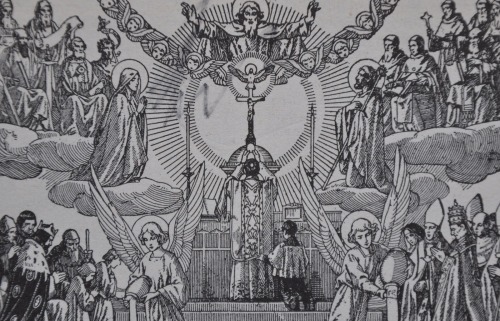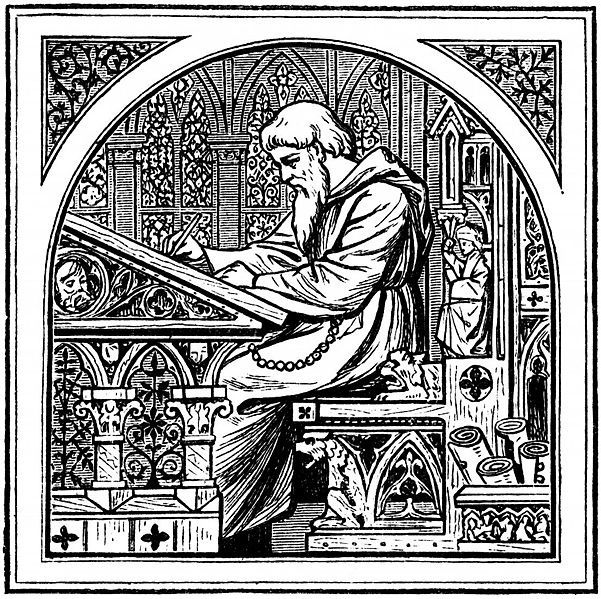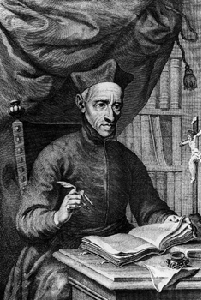Monday, 31 March 2014
Reflection on Detraction
The pillaging of the reputation is far more malignant than the plunder of material goods. The latter may be returned without suffering loss, but the damaged name of another can only be repaired over much time and where the suspicion of doubt will always rest.
St. Bonaventure on the True St. Francis
''True piety which according to the Apostle is helpful for all things, had so filled Francis' heart and penetrated its depths that it seemed to have appropriated the man of God completely into its dominion. This is what drew him up to God through devotion, transformed him into Christ through compassion, attracted him to his neighbour through condescension and symbolically showed a return to the state of original innocence through universal reconciliation with each and every thing. Through his virtue he was attracted to all things in spiritual love, especially to souls redeemed by the precious blood of Jesus Christ. When he saw them being stained by the filth of sin, he grieved with such tender pity that he seemed like a mother who was daily in labour pains bringing them to birth in Christ. This was his principal reason for reverencing the ministers of the word of God, because with their devoted concern for the conversion of sinners they raise up seed for their dead brother, namely Christ, crucified for us, and guide them with their concerned devotion. He firmly held that such work of mercy was more acceptable to the Father of mercies than any sacrifice, especially if this eagerness arose out of perfect charity more by example than by word, more by tear-filled prayer than by long-winged sermons.'' - The Life of Saint Francis
Reflection: The poor friar was a radical lover of God, his whole orientation and being were directed towards and grounded in the mercy of the Lord for the miserable sinner. He grieved over the poor, the innocent, the dejected, the suffering, as he could only envisage the countenance of the Crucified Lord in them. For him, all should tend to God, all should give praise to Him. All belongs to His mercy and goodness. His heart abounded in trust for God Who would bring him and his brothers back to the bosom of His tender goodness. Sin was abhorrent to Francis as it marred the divine likeness in man and could be be an insult of ingratitude to the One Who has offered him so much.
Saturday, 29 March 2014
Reflection on Truth and Feelings
When all validity is relegated to the perception of offense, all objective reality is utterly destroyed.
Reflection on the Temporal Missions
The temporal missions of the Divine Persons mirror exactly the immanent divine life and origins of the subsisting relations as God does not reveal Himself to be other than He is. If it be objected that the Son is set by the Spirit, one must respond that it is in accordance with His assumed humanity. The Second Person is sent by the One who has charity appropriated of Him as it is by charity that God unites Himself to us. Furthermore, as sanctification is by extension appropriated to the Third Person, the hypostatic union is the principle of our redemption.
Friday, 28 March 2014
Reflection on Public and Private Religion
All that is of the natural order is to be referred to God as urgently as all that which pertains to the supernatural. There is no private sphere that prescinds from the dominion nor the paternal solicitude of our Lord and Saviour, the Author of nature and of grace. What has been rendered to Caesar was first given by God and it shall return to Him.
Reflection on Overcoming Pride
Humility most offends the natural and so-call justly possessed notions of self-worth and noble purpose. The desire for acknowledgement by others as you intend good is the deepest thorn of pride to remove.
Wednesday, 26 March 2014
Reflection on the Priesthood
As the priesthood is entirely of the supernatural order, common place notions of inclusivity and opportunity do not apply. The only truly worthy priest is our Lord and High Priest, Christ.
Monday, 24 March 2014
Reflection on Enjoying the Good Things in Life
On Use and Enjoyment: Distinction One of the Sentences
We truly enjoy those things of the created order when we perceive the divine traces that are scattered along the horizon. The divine likeness among creatures forms an ascending and descending hierarchy from and to the Foundation of all delight and our one true rest. We are not to discard with contempt what is beautiful and glorious but we are under obligation to refer them back to their Source. Only in the light of this acknowledgement can we be said to properly use things, not as mere instruments but as finite rays of the divine goodness.
Sunday, 23 March 2014
Saturday, 22 March 2014
Reflection on Mercy
Mercy must not be defined merely as the withholding of punishment due but as the granting of grace to obtain a degree of perfection.
Reflection on Appealing to Compassion
The cry for a renewal appears all the more sweet when it is sickened by the appeal to mercy without consideration of goodness.
Friday, 21 March 2014
Reflection on Truth and Conversion
Let a boy's natural curiosity for knowledge be united with a young man's delight in pursuing and grasping truth, and any moral objection to embracing the Faith will fade away.
Reflection on Predestination
God does not grant a man salvation because He foresees that he will merit it, but rather He grants the merits to make him worthy of it.
Saturday, 15 March 2014
Reflection on Pope Francis and Evangelii Gaudium
For Pope Francis the Joy of the Gospel appears to be founded upon the rejection and negation of all that made the faithful in ages past rejoice at the beautiful, the sublime and the glorious. Instead of an objective complacence in what is truly good, he has exchanged this for a superficial and dangerous glee in poverty so falsely understood.
Reflection on Customs and the Faith
Pious customs and liturgical norms incarnate the Faith so that in the minds of the simple and the learned alike become almost synomymous with our religion. It is for this reason that Suárez considers the Roman Pontiff who puts away the treasures of the Catholic religion to be a schismatic, severing himself from the life and charity of the Body of Christ.
Reflection on the Will and Intellect
The boundless licence of this age appears to precede from the mindless subjection of the intellect to the will. Instead of full formed choices grounded in appreciation of objective really man now considers the very act of choosing to be of primordial importance. How can one choose freely what one does not know? It is for this reason that modern man is frivolous in his pursuit of delight. He becomes emptier as he fills himself up.
Reflection on Who Can Be Saved?
Is there anything more offensive to God's dominion and economy of salvation than to assert that the pleasant shall inherit the kingdom? It is absolutely impossible for the atheist to enter eternal glory no matter the value of his natural works in the sight if men. In an attempt to exalt the mercy of the Lord they besmirch His decrees and oppose His grace. Salvation for them can only consist of the intensification of natural pleasure and not the face of God as He is in Himself.
Reflection on Ambiguity
A prelate's ambiguous words must not be interpreted favourably when he puts the Faith in danger. The view that it is disobedient to oppose his loose speech is to subject man's absolute loyalty to God to his conditional submission to earthly legitimate authority.
Sunday, 9 March 2014
Reflection on Temptation
In matters of temptation, one either falls on God or falls from God. There is no middle term.
Reflection on Modernity
The modern by its nature is relative and consequently always in danger of passing into old-fashionedness particularly quickly. As its newness decreases, so does its relevance. Its instrinsic value is limited to the age in which it finds favour.
Reflection on Adapting to the Times
The sexual morality of the Roman and Hellenistic world of the first century was not very dissimilar to our own. Yet when our Lord came He preached the indissolubility of marriage and the illicitly of acts outwith it. What principle could be further from His divine mind than adapting to "modern sensibilities"!
Saturday, 8 March 2014
On the Divine Relations and Communicable Divine Nature
''There is in God actually, or in the order of reality, only one being, which is not purely absolute or purely relational, neither mixed nor composite, or resulting from either of these, but most eminently and formally possessing that which is relational and that which is absolute. So in the formal order, or in the order of formal reasons, in Himself, not in our mode of speaking, there is in God only one formal reason or essence. This is neither purely absolute nor purely relational, neither purely communicable nor purely incommunicable, but most eminently and formally containing both that which is absolutely perfect and that which the relational Trinity demands. We are in error, however, when we proceed from the absolute and relational to God because we imagine that the distinction between the absolute and the relational is prior to the divine nature. The complete opposite is true, for the divine nature is prior to all being and all of its differences; it is above being, above one, etc...It remains that (God) is both communicable and incommunicable'' - Cajetan.
Commentary: There is a particularly certain danger of regarding the divine relations as something superimposed onto the perfect and complete divine essence. We are not to consider the Persons as being mere accidents existing consequent to the deity, almost as a secondary formation distinct from the Godhead or as having no subsisting reality apart from the reflection of our minds. Nor is the distinction due to the economy of salvation where God appears in time in different guises to communicate some heavenly lesson to frail man. There are no accidents in the actus purus not is there any potentiality for perfectibility in Him. It must be stated here that the Thomists posit a minor virtual distinction between the divine Persons and the divine essence. Our concept of the divine nature implicitly contains paternity while the blessed in their glory intuitively yet not exhaustively know the personal and subsisting divine relations. The obstacle appears to be the fact that while the divine nature is communicated entirely to the Word by the Father, it does not follow that paternity is included in the transmission of the essence. It is for this reason that we say the paternity of the Father is altogether incommunicable or the formal distinction between the Persons would be confused and the divine ''order'' would arise merely from human constructs of reason. There is however an absolute identity of the Father and the Godhead, He truly is God, yet He is not the Son, nor the Spirit, Who each fully possess the entire divine essence. Let us consider prayerfully the dictum of the Council of Florence, ''In God all things are one where there is no opposition of relation''. This supernatural mystery can not by reason alone be demonstrated and it would have remained far above the reaches of man if God had not revealed it to us. A consideration of the cosmos may lead man to an analogous knowledge of the creator of all but there is nothing in nature that can point man infallibly to the Triune nature of God as He is in Himself. On the level of natural theology only a consideration of de Deo uno may be made.
Thursday, 6 March 2014
Reflection on Egalitarianism
Egalitarianism is a pious fiction and a fairy tale imposed on a random assortment of matter by those who claim to have out aside childish religious mythology.
Wednesday, 5 March 2014
Reflection on Liberal Theology
Liberal Catholicism is nothing more than sentimental anthropology. Their only "Theos" is in their belly and their glory is in their shame.
Monday, 3 March 2014
Michael Matt on Criticising Pope Francis
I'll let Michael Matt speak for himself. His words are certainly worthy of consideration. No Catholic should rejoice at the opportunity to rise up against the Holy Father, in fact it should cause us great grief to realise that we have almost been abandoned by the Shepherd who appears oblivious to the dangers that press on from all sides against the Catholic Church. Let us pray constantly for the illumination of the mind of Pope Francis so that his words may at all times mirror the mind of the Church concerning the Orthodox Faith. On the other hand, let us never be so naive to expand the respect due to the office of the Petrine ministry to ridiculous lengths that damage not only the Church but the soul of the very pontiff who could continue in his errors without opposition. Let Christ and the faith He founded be our first consideration and from that we will proceed with the greatest love possible for His Vicar.
Sunday, 2 March 2014
Reflection on Elections
When the far left is considered by the media to be the political moderates any party with a semblance of conservatism can only ever be seen as extremist and reactionary.
Saturday, 1 March 2014
Reflection on the Eternal Father
To claim that Christians, Jews and Muslims share the same Father is to confound the orders of nature and grace. It reduces the baptismal life to nought, resulting in the most deplorable heresies. The error of Pope Francis either consists in material heresy or a dim mind. May the reader chose the most apposite.
Reflection on Favouritism
It is foreign to Catholicism to insist on a poor Church for the poor. This narrow minded exclusivism only leading to factions and self-righteous accusations. Christ is not Saviour for one group in an economic sense. We preach a Catholic Church for the Catholicus.
Subscribe to:
Comments (Atom)









